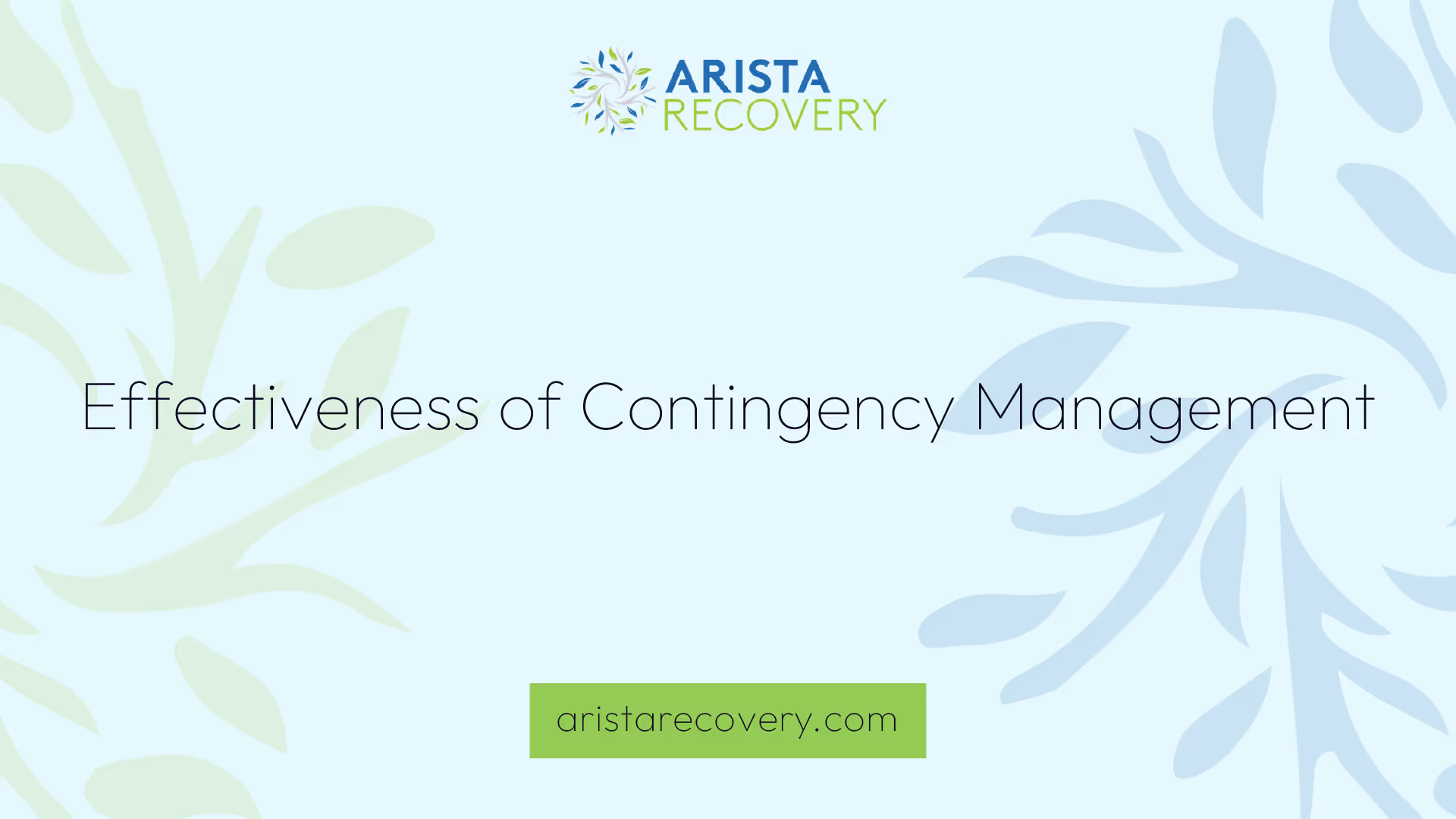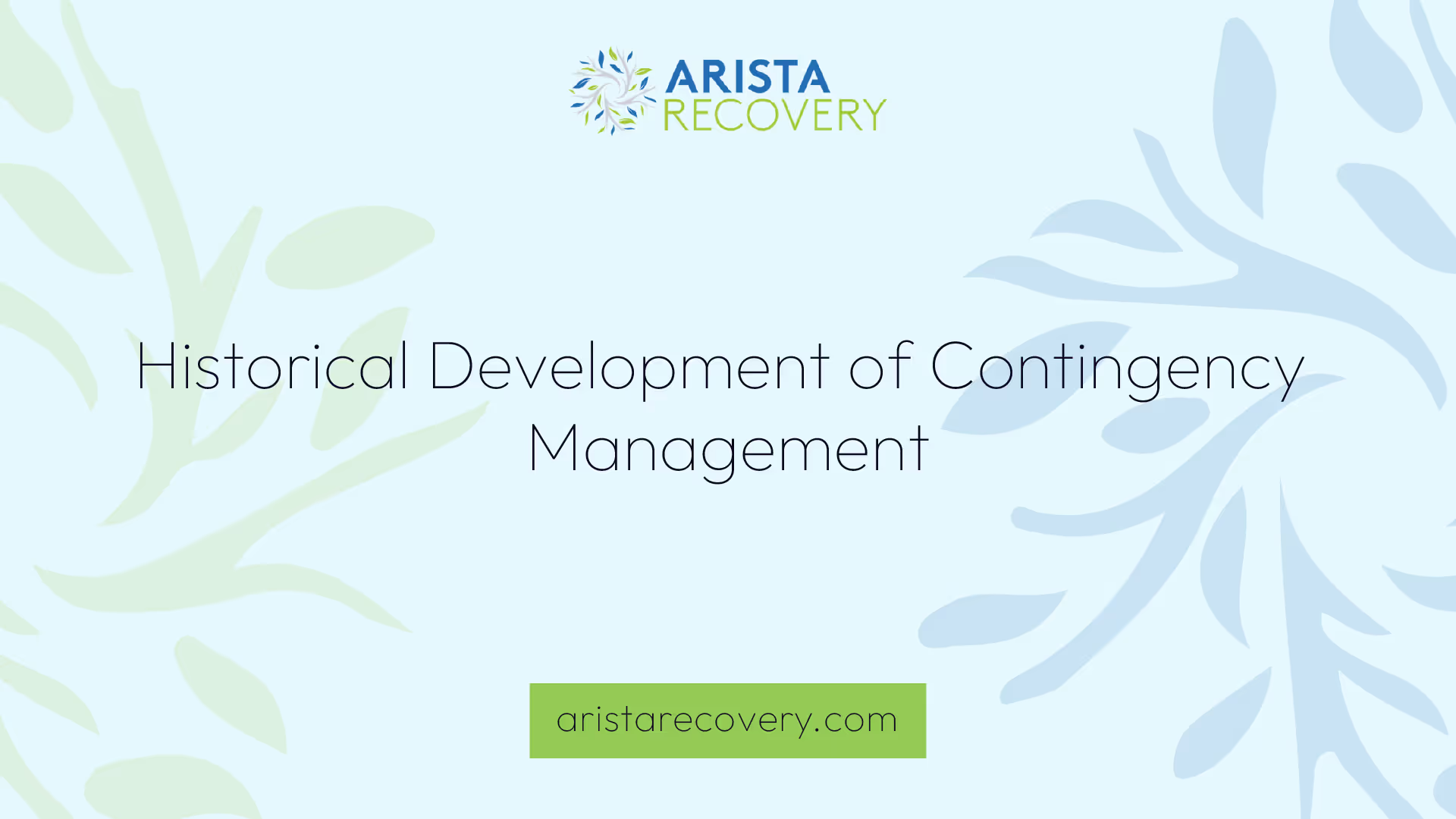What You Should Know About Contingency Management


Understanding Contingency Management
Contingency management is a behavioral intervention that utilizes principles of operant conditioning to promote positive behavior while diminishing negative behavior. By employing a system of rewards and penalties, contingency management aims to facilitate behavior change, particularly in individuals struggling with substance use disorders [1].
Principles of Operant Conditioning
At the core of contingency management is the application of principles derived from operant conditioning. Operant conditioning is a form of learning in which behavior is shaped through consequences. In this context, the emphasis is on reinforcing desirable behaviors and discouraging undesirable behaviors.
The key principle of operant conditioning utilized in contingency management is reinforcement. Reinforcement involves providing rewards or incentives for engaging in positive behaviors. By linking rewards to desired behaviors, individuals are more likely to repeat those behaviors in the future.
In the context of contingency management, reinforcement can take various forms, such as vouchers, privileges, or tangible rewards. These rewards are often contingent upon meeting specific behavioral goals, such as submitting drug-negative urine specimens or attending therapy sessions consistently.
Application in Treatment
Contingency management interventions have been extensively studied and evaluated, particularly in the realm of substance misuse treatment. These interventions commonly employ monetary-based reinforcers, where individuals receive rewards such as vouchers that can be exchanged for goods or services when they demonstrate drug-negative urine specimens.
The use of contingency management in substance use disorder treatment has shown promising results. It has been associated with increased rates of treatment retention, improved treatment outcomes, and sustained abstinence from drug use. By providing immediate and tangible rewards for abstinent behavior, contingency management helps to reinforce positive changes and motivate individuals to continue their recovery journey.
Moreover, contingency management can be adapted and applied in various treatment settings, including both clinical environments and behavioral interventions. The principles of contingency management can be tailored to meet the specific needs and goals of different populations, enhancing the effectiveness of treatment approaches.
By understanding the principles of operant conditioning and the application of contingency management in treatment, psychiatrists and healthcare professionals can utilize evidence-based approaches to support individuals with addiction problems. To learn more about the techniques and strategies involved in contingency management, refer to our article on contingency management techniques for psychiatrists.

Effectiveness of Contingency Management
Contingency management (CM) has been widely recognized as an effective treatment approach for individuals with substance use disorders. This evidence-based intervention utilizes reinforcement or rewards to promote positive behavioral changes. Let's explore the empirical support and impact on behavior change associated with contingency management.
Empirical Support
Contingency management has strong empirical support as a conjunctive intervention to increase psychosocial treatment and medication adherence, making it one of the most effective treatment approaches for substance use disorder [3]. Numerous studies have demonstrated the efficacy of contingency management in reducing substance use and improving treatment outcomes.
A meta-analysis of psychosocial treatments for substance use disorders found that contingency management had the greatest effect size among the interventions studied [2]. This analysis showed that contingency management interventions resulted in successful treatment episodes 61% of the time, compared to 39% with other treatments. These findings highlight the significant impact of contingency management in the context of substance use disorder treatment.
Impact on Behavior Change
Contingency management can be applied to various patient behaviors, such as increasing abstinence, encouraging attendance in mental health treatment settings, enhancing adherence to psychiatric medications, reducing weight, and improving exercise. It has been shown to be efficacious across a range of populations and settings.
For substance use disorders, contingency management interventions have been successful in promoting abstinence from alcohol, benzodiazepines, cocaine, nicotine, opiates, marijuana, and methamphetamine [4]. Studies have consistently demonstrated that contingency management significantly increases rates and duration of abstinence compared to standard treatment. It has shown positive results in reducing substance use and enhancing treatment outcomes, leading to improved recovery outcomes for individuals struggling with addiction [4].
The impact of contingency management extends beyond substance use disorders. It has also been applied successfully in various other behavioral domains, such as weight reduction and exercise promotion. This versatility highlights the potential of contingency management as an effective intervention in diverse psychiatric treatment settings [2].
In conclusion, contingency management has garnered strong empirical support as an effective treatment approach for substance use disorders and other behavioral challenges. Its ability to reinforce positive behavior changes has been consistently demonstrated across various populations and settings. The evidence supports the use of contingency management as a valuable tool in the treatment of addiction and in enhancing treatment outcomes for individuals with psychiatric disorders.

Historical Development of Contingency Management
Contingency management, an evidence-based approach used in various treatment settings, has a rich history of development and application. In this section, we will explore the origins, pioneers, and the evolution of contingency management into the realm of human behavior.
Origins and Pioneers
The foundations of contingency management can be traced back to the early 1970s, thanks to the pioneering work of Dr. Edward E. Jones and Dr. Richard A. Ratcliff. Initially devised for animal behavior research, particularly in pigeons, their exploration of behavioral principles laid the groundwork for the expansion of contingency management into other domains, including human behavior.
The early experiments conducted by Jones and Ratcliff demonstrated that behaviors that were reinforced in close temporal proximity to their occurrence increased in frequency. This concept became a fundamental principle of contingency management interventions, which involve the provision of reinforcement or rewards for positive behavioral changes.
Evolution into Human Behavior
Building upon the foundational research in animal behavior, contingency management was further developed and adapted for use in human behavior. The principles of basic behavioral analysis, including reinforcement and positive incentives, were applied to various settings, including clinical environments and behavioral interventions.
Contingency management interventions have shown great efficacy in the treatment of substance use and related disorders. In fact, meta-analyses of psychosocial treatments for substance use disorders have consistently found contingency management to have the greatest effect size, demonstrating its effectiveness across a range of populations and settings.
In psychiatric settings, contingency management has been utilized to enhance retention in treatment, reduce drug use in individuals with dual diagnoses, foster adherence to medications, assist in weight loss, and increase adherence to exercise regimens. By integrating contingency management into psychiatric practice, treatment outcomes can be significantly improved, benefiting both patients and providers [2].
The historical development of contingency management has paved the way for its wide application today. Through the continued exploration and refinement of its techniques, contingency management has become a valuable tool in promoting positive behavioral change and enhancing treatment outcomes in a variety of settings. As its potential in psychiatric treatment becomes increasingly recognized, the future of contingency management holds promise for improving the lives of individuals with addiction and related disorders.
Application in Various Settings
Contingency management, with its focus on reinforcement and rewards for positive behavioral changes, is a versatile approach that can be applied in different settings. Let's explore how it is utilized in clinical environments and behavioral interventions.
Clinical Environments
In clinical settings, contingency management has proven to be a valuable tool in promoting positive outcomes for patients. It can be used to reinforce desired behaviors and discourage harmful or unwanted behaviors. One common application of contingency management in clinical environments is through the use of a token economy. This approach, frequently implemented in treatment centers and therapeutic settings, involves providing patients with tokens or points that can be exchanged for rewards or privileges [1].
Contingency management interventions have been found to be effective in a variety of clinical scenarios. For example, it can be used to encourage attendance in mental health treatment settings, enhance adherence to psychiatric medications, reduce weight, and improve exercise. By reinforcing positive behaviors and providing incentives, contingency management can help individuals with addiction problems and psychiatric disorders stay engaged in treatment and make progress towards their recovery goals.
Behavioral Interventions
Contingency management also plays a crucial role in behavioral interventions outside of clinical environments. It is widely employed in everyday settings such as schools, workplaces, and even childcare. For instance, a child might be rewarded with their favorite snack each time they tidy up their toys, reinforcing positive behavior [1]. In these contexts, contingency management helps to shape behavior by providing immediate and tangible rewards.
By utilizing evidence-based approaches in contingency management, such as token economies and reinforcement strategies, behavioral interventions can effectively promote desired behaviors and discourage undesired ones. This can be particularly beneficial in helping individuals with addiction problems develop new habits, reduce substance use, and improve their overall well-being.
In summary, contingency management is a versatile approach that can be applied in various settings. In clinical environments, it can enhance treatment outcomes by reinforcing positive behaviors and encouraging patient engagement. In behavioral interventions, it can shape behaviors and promote desired outcomes. The effectiveness and adaptability of contingency management make it a valuable tool in supporting individuals with addiction problems and psychiatric disorders.
Challenges and Barriers
Implementing contingency management in clinical settings and raising awareness about its effectiveness can be met with various challenges and barriers. Overcoming these hurdles is crucial to ensure the successful integration of contingency management as a valuable treatment approach for individuals with addiction problems.
Implementation Hurdles
One of the primary challenges in the implementation of contingency management is the lack of awareness and familiarity among mental health providers. Surveys indicate that few clinicians are aware of this evidence-based intervention, and even fewer incorporate it into their practice [2]. This lack of knowledge can stem from a variety of factors, including limited formal training in behavior analysis and a disconnect between research and practice.
Furthermore, ideological concerns may hinder the adoption of contingency management techniques for psychiatrists. Some providers may have reservations or misconceptions about utilizing rewards or incentives as part of treatment. Addressing these concerns and providing education on the underlying principles and effectiveness of contingency management is essential to overcome these implementation hurdles.
Cost can also be a significant barrier to implementation. The resources required to administer contingency management programs, such as providing rewards or incentives, may be perceived as a financial burden for some treatment facilities. Exploring cost-effective approaches and demonstrating the long-term benefits of contingency management can help alleviate these concerns and facilitate its implementation.
Lack of Awareness
Another significant barrier to the widespread use of contingency management is the overall lack of awareness among mental health providers. Despite its established efficacy, this empirically validated treatment remains unfamiliar to many clinicians [2]. The limited dissemination of information about contingency management contributes to this lack of awareness.
To address this issue, efforts should be made to enhance the visibility and accessibility of information regarding contingency management. This can be achieved through professional training programs, workshops, and continuing education opportunities for mental health providers. By increasing awareness and understanding of contingency management, more clinicians can incorporate this evidence-based approach into their practice, ultimately benefiting individuals with addiction problems.
In summary, challenges and barriers exist when it comes to implementing contingency management in clinical settings. These include limited awareness and familiarity among mental health providers, ideological concerns, disconnect between research and practice, and cost considerations. Overcoming these hurdles requires targeted education and training programs, addressing ideological concerns, and emphasizing the long-term benefits and cost-effectiveness of contingency management. By doing so, the integration of contingency management as a treatment approach can be enhanced, leading to improved outcomes for individuals seeking help for addiction problems.
Future of Contingency Management
As the field of psychiatry continues to evolve, the future of contingency management holds great promise. This evidence-based approach has shown effectiveness in various settings, and its potential in psychiatric treatment is gaining recognition.
Potential in Psychiatric Treatment
Contingency management can be applied in psychiatric settings to enhance retention in treatment, reduce drug use in individuals with dual diagnoses, reinforce adherence to medications, assist in weight loss, and increase adherence to exercise regimens. By implementing contingency management techniques, psychiatrists can provide additional support and incentives to their patients, thereby improving treatment outcomes.
In substance use disorders, contingency management has been identified as a highly effective treatment. It involves reinforcing individuals for positive behavioral changes, such as submitting drug-negative urine samples, through rewards like vouchers or the chance to win prizes. This approach has been recommended by the UK National Institute for Health and Clinical Excellence guidelines. However, contingency management is still underutilized in the field of psychiatry, with limited awareness among mental health professionals.
By incorporating contingency management into psychiatric treatment, psychiatrists can enhance patient engagement and motivation. This approach provides tangible rewards for desired behaviors, reinforcing positive changes and increasing treatment compliance. The potential benefits extend beyond substance use disorders, with applications in areas such as medication adherence, weight management, and exercise adherence.
Enhancing Treatment Outcomes
Contingency management has consistently shown positive results in reducing substance use and enhancing treatment outcomes. Its efficacy has been demonstrated across a range of populations and settings. By integrating this evidence-based approach into psychiatric treatment, psychiatrists have the opportunity to significantly contribute to the well-being of their patients.
To fully harness the potential of contingency management, psychiatrists should familiarize themselves with the techniques and strategies involved. By staying informed about evidence-based approaches in contingency management, they can effectively tailor treatment plans to meet the unique needs of their patients. This may involve collaborating with other professionals, such as addiction specialists, to ensure comprehensive care.
As the future unfolds, the application of contingency management in psychiatric treatment has the potential to improve outcomes for patients, providers, and society as a whole. By embracing this approach and actively incorporating it into their practice, psychiatrists can play a vital role in promoting positive behavioral change and supporting individuals on their journey to recovery.
References
[2]:
[3]:
[4]:
We are here for you
You’ve taken the first steps, let us take you further. Arista Recovery is committed to ensuring that individuals and families impacted by substance use receive best in class care.








.jpg)
.jpg)
